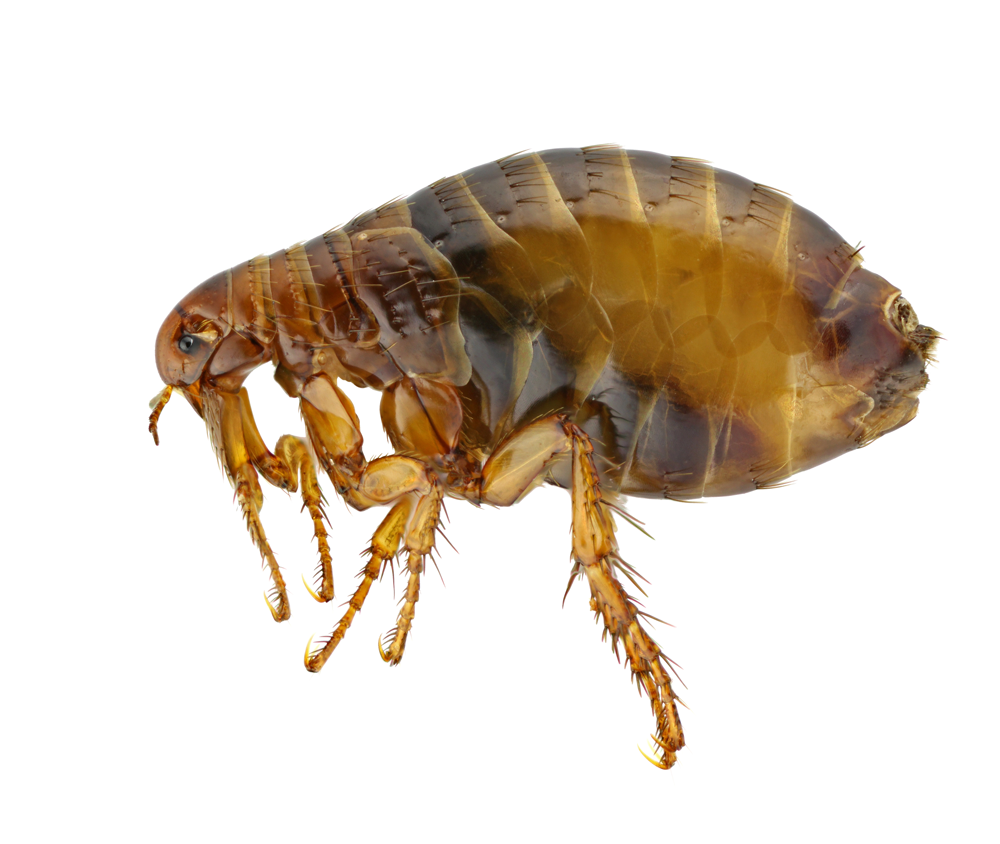Fleas are commonly detected in homes with pets. Fleas can move from cats, dogs, possums, and other warm-blooded animals to people, consuming blood along the way. The female flea lays several hundred eggs at a time, usually after a blood meal, concealing them in chairs, rugs, carpets, and floorboards. Bites from fleas can cause a lot of irritation and can become infected from continued scratching. Some people may experience severe allergic reactions.
Fleas prefer warm, humid environments and breed mainly in the warmer months. Hence, ‘flea plagues’ usually occur during summer, especially outdoors. When fleas are active in warm weather, they become very aggressive in attacking our pets. They can leap great distances to get a grip on any mammal’s fur. Their bodies are as hard as armor, and they have evolved to be highly resistant to our animals’ scratching and biting. Fleas will also bite humans when they have a chance -- they are attracted to any warm-blooded animal they can latch onto.
Before any treatment takes place, the premises should be carefully cleaned, especially under furniture and carpet edges. Upholstered furniture and areas where pets rest or sleep should be given special attention. All vacuumings should be burnt or sprayed with an aerosol to kill off fleas and larvae present.
Ten fleas can potentially reproduce to 250,000 in only 30 days! For a treatment to be successful, both the building and surrounds, and any residing pets need to be treated at the same time. This usually includes a ‘spot’ application and flea collars on your pets. Pet bedding should be washed or replaced, and the pets should be given a flea wash. Your local veterinarian will advise you of the best product to use.
We all know of the irritation, and allergic reactions fleas bring to our pets. The biting and gnawing become incessant, and fleas eventually transmit internal parasites like worms to our pet if they are finally bitten off and swallowed. Fleas also transmit diseases to humans as well as pets -- Trench Fever, Typhus, and Cat Scratch Fever, to name a few.
Like our pets, humans can have adverse allergic reactions to flea bites. When an insect bites humans, the immune system releases histamines, which can result in swelling, itching, and irritation. Humans scratch bites like animals do, and the scratching opens up the much higher risk of new infection and irritation.
Even with veterinarian-approved treatments that kill fleas on your pets, destroying the existing fleas is only part of the solution. Fleas lay eggs that survive when not on your pet’s fur but scattered inside your home. When hatched, flea larvae cling to fuzzy surfaces and then start the life cycle all over by searching for a mammal to feed on. For up to two weeks after treatment, flea eggs will continue to hatch. Floors should not be washed or vacuumed during this period to allow the newly hatched fleas to contact the chemical. A follow-up service can be beneficial, as insecticides do not penetrate the eggs, and nymphs can emerge weeks after the initial service. We will discuss with you if follow-up treatment is necessary after the initial site visit.
Don’t let fleas get the jump on you -- let Auswise Pest Control jump on the fleas! We will carefully and professionally inspect your home to help develop a plan for effective flea management and control using proper treatments safely and effectively. If necessary, we will also advise you on outdoor treatments that may also be needed to prevent future infestation. Call us today for more information on total flea treatment for your home and property.

